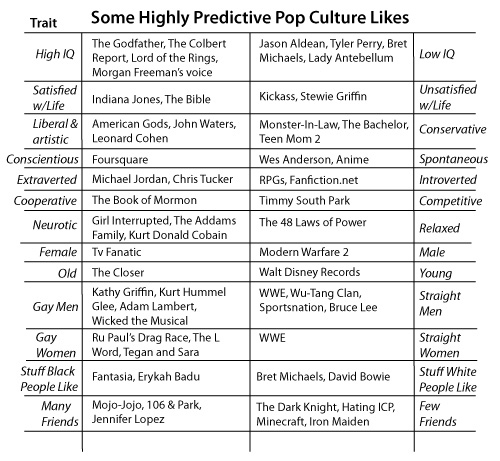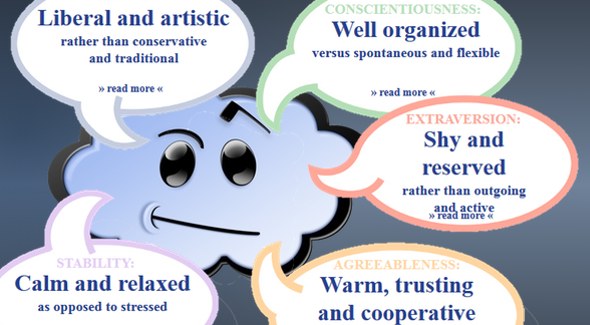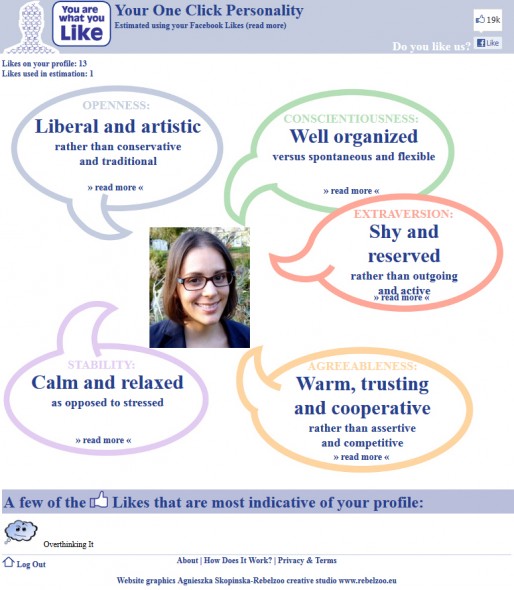Oh, Overthinking It fans. You’re so great. I’m not saying it just to flatter you. It’s true! You’re kind, you’re open to new experiences, you’re conscientious. Most of you are introverts, and that’s cool. We like fans who prefer to snuggle up with a podcast on a Saturday night. You’d think overthinkers would be neurotic, but you’re not. You’re pretty well-adjusted (for people on the Internet, at least).
These aren’t my opinions. This is Science. True blue, replicatable, testable, observable Science.
You see, some smarty-pants folks from the University of Cambridge did a study that showed that one’s Facebook Likes “can be used to automatically and accurately predict a range of highly sensitive personal attributes including: sexual orientation, ethnicity, religious and political views, personality traits, intelligence, happiness, use of addictive substances, parental separation, age, and gender.” They also made a website that calculates your scores on the Big Five Personality traits based on your Facebook Likes. And if you happen to Like Overthinking It on Facebook, here’s what happens:
How did they figure this out? They went through the Likes and MyPersonality profiles of over 58,000 Facebook users and (like good overthinkers) made some charts. The data show that it’s pretty easy to use someone’s Likes to determine the person’s race, gender, sexuality, political leanings, and religion (among other things). If you’re worried that evil advertising firms, credit agencies, psychologists, and governments will use this information to continue subjecting you to a level of scrutiny you probably don’t deserve, you are SOL, my friend. That’s what you get for being so warm, trusting, and cooperative.
I encourage you to read the whole study and these two supplemental PDFs. To avoid copyright infringement, I’ve made my own chart based on the researchers’ findings. Overthinking It is, I’m told, a pop culture website, so I focused only on the pop culture-related items:

So the next time you’re at an open mic night and want to make the most accurate stereotype joke possible, look at this chart. Then when you say, “White people like Bret Michaels,” you’ll have science on your side. (White people, amirite?? I’ll be here all night, folks.)
Care to draw any conclusions from this information? By all means, do so in the comments! I’d like to hear what you kind, artistic, conscientious, introverted, and relaxed people have to say.


Likes on profile 13, Likes used for estimation 1. One!!!!
That’s probably because Overthinking It has the most Likes of the 13 fan pages I Like. My other Likes are mostly small, YA-lit-related pages that only have a few hundred Likes. And now I’m going to write the word Like five more times, because I haven’t written it enough already: Like Like Like Like Like
This doesn’t feel any more substantive to me than those online quizzes that tell you which character from Laguna Beach you are the most like. That’s the only one of those I ever remember taking, and I took it because there was apparently a girl named Morgan on it and I wanted to get her as the answer for humor’s sake. Through guessing having never seen the show, I nailed it on the first try. This remains my greatest accomplishment as a human person.
I’d have to read through the studies in detail (just took a short break to read the article without clicking through), but I wonder if these results run into a risk of self-selecting. After all, it’s entirely possible to like something in real life, but not “like” it on Facebook because it doesn’t fit with the image of yourself you’re trying to build.
We covered a study on Psycomedia that found good evidence that our facebook profiles reflect our actual personalities.
I see it more as being the same issue that arises when you go to a psychic. It’s not exactly that they’re telling you what you want to hear but for the most part they won’t describe you with overly negative terms so you’re more inclined to agree with the assessment and fit your view of yourself to what you’re being told. For instance, say you normally think of yourself as a extrovert but get told you’re an introvert. Well, most people probably have qualities of both an introvert and an extrovert so they’ll think, oh, this program is picking up on that other part of my personality.
When I first saw a headline on this my reaction was pretty skeptical. But considering the mechanics of it this might be a genius-level advertising monster.
The sort of categoric predictions they’re making remind me immediately of “The Music Genome Project” (renamed as Pandora Media in 2005): Catalog traits, find and Tag those traits, catalog user reaction, vector & predict.
I’m still amazed how Pandora accurately manages to guess what I will like. I fear/love what this theory could do for online advertising.
The only issue with the most indicative likes defining personality types is that brands can use ‘like me’ competitions to gain more likes. Those who like the brand because of a competition can be hard to distinguish between those who generally like page.
Also, is anyone else curious as to whether liking ‘Your one click personality’ will effect the results?
Seems to me that the prizes in those kinds of competitions usually reflect something about the brand, if they aren’t indeed items produced by the brand. So if someone likes the brand enough to enter in the first place, that can be construed to be a certain amount of, uh, like-age?
My major issue with the ‘youarewhatyoulike’ results is that some of my most indicative likes are not reflections of what i actulaly
disregard last post, that was my first comment and i never finished writing it.
I always see personality tests as a bit of question-begging — how does the personality test know what your personality is? You tell it! Why is it right? It agrees with what you told it, so whether it’s right or not, it’s right to you.
Although this one called me “calm and relaxed” and “well organized,” a set of traits I have never associated with myself.
Regardless, I am not surprised it thinks our readers are awesome. If it didn’t, it would have no credibility at all :-)
Eh, I just did this, and I think it’s about 1/3 right. I’m anything BUT relaxed (I mean, c’mon, I’m in grad school), I’m highly disorganized, and I’m excessively outgoing.
There’s a different one that uses your statuses as opposed to your likes to determine “who you are” going around called “Social Me.” Link: http://www.zeebly.com/social_me
Most of the characteristics this You Are What You Like thing told me I have are the opposite of the Social Me one. So…
OH MY GOD I’M HAVING AN IDENTITY CRISIS WHO AM I!?!?
Well, if you look at the study, some of the correlations are more robust than others. Likes are really good at telling people your race, gender, sexual orientation, political party, and age. They’re so-so at determining your level of extraversion and openness (as well as your IQ) and pretty crappy at determining your level of conscientiousness. And as Fenzel pointed out above, personality traits are impossible to measure objectively, so you’re right to take this all with a grain of salt.